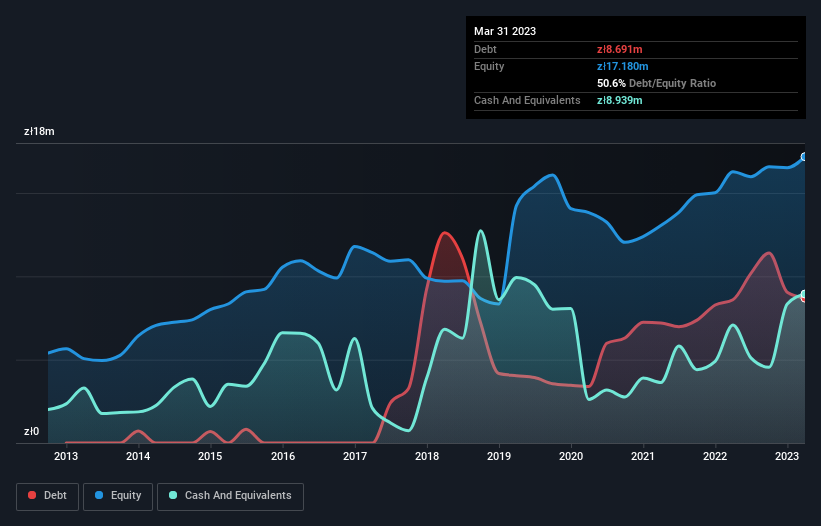- Poland
- /
- Telecom Services and Carriers
- /
- WSE:VRB
These 4 Measures Indicate That Verbicom (WSE:VRB) Is Using Debt Extensively
David Iben put it well when he said, 'Volatility is not a risk we care about. What we care about is avoiding the permanent loss of capital.' So it seems the smart money knows that debt - which is usually involved in bankruptcies - is a very important factor, when you assess how risky a company is. We can see that Verbicom S.A. (WSE:VRB) does use debt in its business. But should shareholders be worried about its use of debt?
When Is Debt A Problem?
Debt is a tool to help businesses grow, but if a business is incapable of paying off its lenders, then it exists at their mercy. Part and parcel of capitalism is the process of 'creative destruction' where failed businesses are mercilessly liquidated by their bankers. However, a more common (but still painful) scenario is that it has to raise new equity capital at a low price, thus permanently diluting shareholders. Of course, plenty of companies use debt to fund growth, without any negative consequences. When we think about a company's use of debt, we first look at cash and debt together.
See our latest analysis for Verbicom
What Is Verbicom's Debt?
As you can see below, Verbicom had zł8.69m of debt, at March 2023, which is about the same as the year before. You can click the chart for greater detail. But on the other hand it also has zł8.94m in cash, leading to a zł247.6k net cash position.

A Look At Verbicom's Liabilities
According to the last reported balance sheet, Verbicom had liabilities of zł24.7m due within 12 months, and liabilities of zł3.49m due beyond 12 months. Offsetting this, it had zł8.94m in cash and zł7.58m in receivables that were due within 12 months. So its liabilities outweigh the sum of its cash and (near-term) receivables by zł11.6m.
When you consider that this deficiency exceeds the company's zł10.2m market capitalization, you might well be inclined to review the balance sheet intently. In the scenario where the company had to clean up its balance sheet quickly, it seems likely shareholders would suffer extensive dilution. Given that Verbicom has more cash than debt, we're pretty confident it can handle its debt, despite the fact that it has a lot of liabilities in total.
The modesty of its debt load may become crucial for Verbicom if management cannot prevent a repeat of the 52% cut to EBIT over the last year. When it comes to paying off debt, falling earnings are no more useful than sugary sodas are for your health. The balance sheet is clearly the area to focus on when you are analysing debt. But it is Verbicom's earnings that will influence how the balance sheet holds up in the future. So when considering debt, it's definitely worth looking at the earnings trend. Click here for an interactive snapshot.
But our final consideration is also important, because a company cannot pay debt with paper profits; it needs cold hard cash. Verbicom may have net cash on the balance sheet, but it is still interesting to look at how well the business converts its earnings before interest and tax (EBIT) to free cash flow, because that will influence both its need for, and its capacity to manage debt. Over the most recent three years, Verbicom recorded free cash flow worth 55% of its EBIT, which is around normal, given free cash flow excludes interest and tax. This cold hard cash means it can reduce its debt when it wants to.
Summing Up
While Verbicom does have more liabilities than liquid assets, it also has net cash of zł247.6k. Despite the cash, we do find Verbicom's EBIT growth rate concerning, so we're not particularly comfortable with the stock. When analysing debt levels, the balance sheet is the obvious place to start. However, not all investment risk resides within the balance sheet - far from it. Case in point: We've spotted 3 warning signs for Verbicom you should be aware of, and 1 of them is a bit unpleasant.
Of course, if you're the type of investor who prefers buying stocks without the burden of debt, then don't hesitate to discover our exclusive list of net cash growth stocks, today.
New: Manage All Your Stock Portfolios in One Place
We've created the ultimate portfolio companion for stock investors, and it's free.
• Connect an unlimited number of Portfolios and see your total in one currency
• Be alerted to new Warning Signs or Risks via email or mobile
• Track the Fair Value of your stocks
Have feedback on this article? Concerned about the content? Get in touch with us directly. Alternatively, email editorial-team (at) simplywallst.com.
This article by Simply Wall St is general in nature. We provide commentary based on historical data and analyst forecasts only using an unbiased methodology and our articles are not intended to be financial advice. It does not constitute a recommendation to buy or sell any stock, and does not take account of your objectives, or your financial situation. We aim to bring you long-term focused analysis driven by fundamental data. Note that our analysis may not factor in the latest price-sensitive company announcements or qualitative material. Simply Wall St has no position in any stocks mentioned.
About WSE:VRB
Excellent balance sheet with slight risk.
Market Insights
Community Narratives



